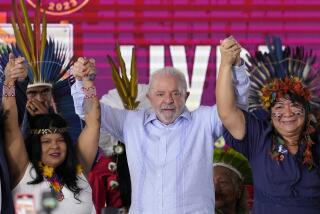HUMAN RIGHTS : Freedom Eludes Many in World : More nations qualify as free, but a report says most of the world’s population lives in ‘not free’ countries such as China and Kuwait.
- Share via
WASHINGTON — The number of countries across the globe that qualify as free has reached a record high of 75, although the total population living in freedom has fallen, a human rights organization reports.
The list of “free” nations increased by 13 in 1991, largely reflecting the collapse of communism in the old Soviet Union and Eastern Europe but also because of some gains in Africa and Asia.
In its annual report, the New York-based Freedom House, which has monitored the world’s political temperature since 1955, hailed the continuing gains of democracy. At the same time, however, Freedom House recorded the decline of India--which calls itself the world’s largest democracy--to the category of “partly free” because of extremely violent national elections following the assassination of Prime Minister Rajiv Gandhi and harsh repression in Kashmir.
India’s huge population--870 million--means that the total number of people living in freedom dropped from 2.1 billion, or 39% of the world’s inhabitants, to 1.4 billion at the end of the year despite the addition of the new democracies. The change also means that the largest number of the world’s people are living in 55 countries rated as “partly free.”
Of the 1.7 billion people classified as “not free,” China’s 1.1 billion constitutes two-thirds of the total, Freedom House reports. China was also singled out as one of the 13 worst violators of human rights, with a prison population of 20 million, at least 10% of whom are believed to be confined for political reasons. Two Western Hemisphere nations--Cuba and Haiti--remained on the list of worst offenders.
George B. Zarycky, Freedom House’s specialist for Eastern Europe, warned that despite the wave of change that has swept the former Soviet Bloc in the last two years, “the new democracies are still under siege.” People unaccustomed to inflation, unemployment and other vagaries of a market economy are highly susceptible to criticism by the old guard, some of them still active under new political banners, he said.
“These ‘renamed Communists’ are still strong,” Zarycky said. “In Romania they are still in control, and even in Czechoslovakia and Hungary, which have the best chance of making a smooth transition, there is still the problem of the old nomenklatura (hierarchy), especially in the rural areas. The situation in most countries is ripe for exploitation by extremists of both left and right.”
Executive Director R. Bruce McColm, presenting the report at a Capitol luncheon this week, explained that the changes in the disintegrating Soviet Union occurred too late to rank newly independent republics, although the old Soviet Union was rated as “partly free” for the year. McColm said the Russian Federation and Ukraine appear to be the freest of the new states, while those in Asia would probably be classified at the moment as “not free.” The three Baltic republics of Estonia, Lithuania and Latvia were all rated as “free.”
Gains in Africa, where four nations--Benin, Cape Verde, Zambia, and Sao Tome and Principe--moved to the category of “free,” were results of the shake-up in Moscow, according to Joseph E. Ryan, a comparative political scientist.
“(Soviet President Mikhail S.) Gorbachev’s reforms really de-legitimized the one-party state,” he said. “African leaders could no longer hold up the Soviet image to their people.”
One of the ironies of the report was that Kuwait, the Persian Gulf emirate for which the Western democracies staged the “Desert Storm” war of liberation from Iraqi occupation, advanced only slightly in the new rankings and was still rated as “not free.” “The royal family has promised elections in 1992, maybe,” Ryan said.
A total of 171 nations and 61 territories, including six belonging to the United States, were evaluated in the survey. The ratings are based on both the status of political rights and the quality of civil liberties, meaning that not only the fact of elections but also the degree of real choice is rated. Freedom of expression is a primary concern among civil liberties.
Changing Status
Thirteen more nations were rated as “free” in 1991 by Freedom House. But six became less free. Newly Free
Bangladesh
Benin
Bulgaria
Cape Verde
Estonia
Latvia
Lithuania
Marshall Islands
Micronesia
Mongolia
Nepal
Sao Tome and Principe
Zambia Less Free
Antigua/Barbuda
Haiti
India
Thailand
Uganda
Yugoslavia
More to Read
Sign up for Essential California
The most important California stories and recommendations in your inbox every morning.
You may occasionally receive promotional content from the Los Angeles Times.













